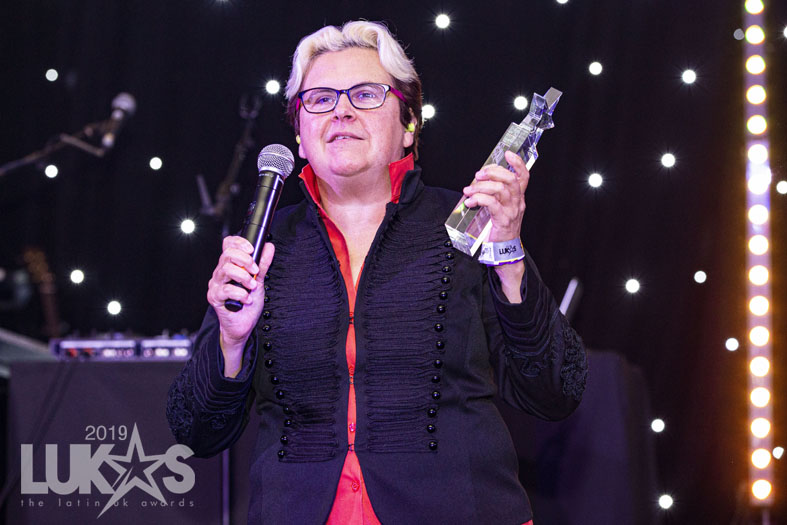From the deep, hypnotic rhythms of Cuba to the stiff splendour of the Royal Albert Hall, composer and conductor Odaline de la Martinez has ridden the waves of a musical adventure. The recipient of this year's LUKAS Lifetime Achievement Award for contribution to music spoke to Benjamin Wein on culture, Castro and the sounds that inspire.

On one fateful August evening in 1984, Odaline de la Martinez walked onto the stage at the Royal Albert Hall, ready to conduct her orchestra.
On that day, there was much more than music at stake. While those may have been small steps for Odaline, they were giant steps for womankind, as that night - in the long, illustrious history of the Proms - she became the first ever female conductor.
“I wasn’t nervous” she tells me. “I thought, how can I get nervous and ruin this?”
As unlikely as that level of confidence may sound, it doesn’t take long chatting with Odaline to believe it.
Born in Cuba, she was surrounded by music from her infancy. “I remember going to sleep with Afro-Cuban drumming” she says. “It’s really influenced my music.”
It was the strength of that West African heritage, which made the island so vibrant. “Cuba preserved the theatre, it preserved the poetry, it preserved the dancing” she tells me.
But those sweet melodies were brought to an abrupt end, as more turbulent times arrived.
“My father had a small coffee business, we were middle class, we weren’t political. First they got rid of the big industries, and then it was my father’s”.
“I had clear memories of the Bay of Pigs. They were bringing people to the hospital. It was so full that they had to leave them at the entrance.”
Still only a child, Odaline’s parents sent her and her sister westward. The pair arrived in Arizona to live with an aunt and uncle. It exposed her to another culture which fascinated her immediately. Not American, but Mexican.
“I was in awe of Mexican culture, and I never felt discriminated against”.
But this love affair had to end too.
Next was a place so steeped in musical history, it seems like fate alone had carried her there. New Orleans, the Deep South. Cotton fields, Jazz, Blues, stinking heat and Mardi Gras. If Odaline’s life were a song, it was about to break into its rapturous chorus.
“Oh New Orleans, loved it! Loved it!...If you want to be wild you can be wild, I’m not saying I was an angel… But I was studying hard”.
Well, let’s assume there was plenty of both in those years.
That place at New Orleans’ Tulane University to study mathematics catapulted her into a world of opportunity, where she was able to follow her true passions. There should be no surprise then that she left Tulane without a degree in mathematics, but instead with one in music.
Where many would see contradiction, Odaline sees connection: “Mathematics is about solving problems, and so is composing.”
With a delicate ear, and an eye for calculation the opportunities kept coming. Cooler climes beckoned, as the allure of The Royal Academy of Music brought her eastward to a strange little island.
I ask what shocked her most when she arrived to the UK. “Everything! They drive on the left, they turn the lightbulb the other way!”
Do we? I wonder.
She amuses herself, recalling our penchant for politeness, donning her best home counties accent: “Sorry, sorry, goodmorning, sorry!”
“I remember showing up to the Royal Academy of Music in shorts” she told me laughing.
“Was it that warm?”
“No! Because it was the Royal Academy of Music. I just wanted to be cheeky.”
That subversive tendency - not rebelliousness as such - but as she put it - cheekiness, has followed Odaline through her musical career.
Lontano, her ensemble, was inspired by that need to go against the grain. “We wanted to do the stuff that was being ignored. Back in 1976 they were playing kind of establishment music.”
Lontano has toured the world playing contemporary classical, with a focus on Latin American, and female composers.
And so it was perfectly apt that Odaline was picked to become the first woman to ever conduct at the proms. Something she still recalls as her “proudest moment”.
As our conversation draws to a close, there is just one final question I have to ask: “If democracy came to Cuba, and you could return triumphantly, and put on a show, what would it be?”
“Maybe it’s a bit narcissistic, but I would bring my opera Imoinda - it’s a story of love and slavery.”
Love, pain, slavery, freedom. No doubt, on that day in Havana, it will bring the house down.
Even after so many years in the UK, Odaline still feels a deep connection to that place that she first felt the pulse and flow of the beating drum. It has held her in a trance, guiding her through an odyssey of tempo and tone.
“I’ll always be Cuban” she exclaimed. “You can take the girl out of Cuba, but you can never take Cuba out of the girl.”



